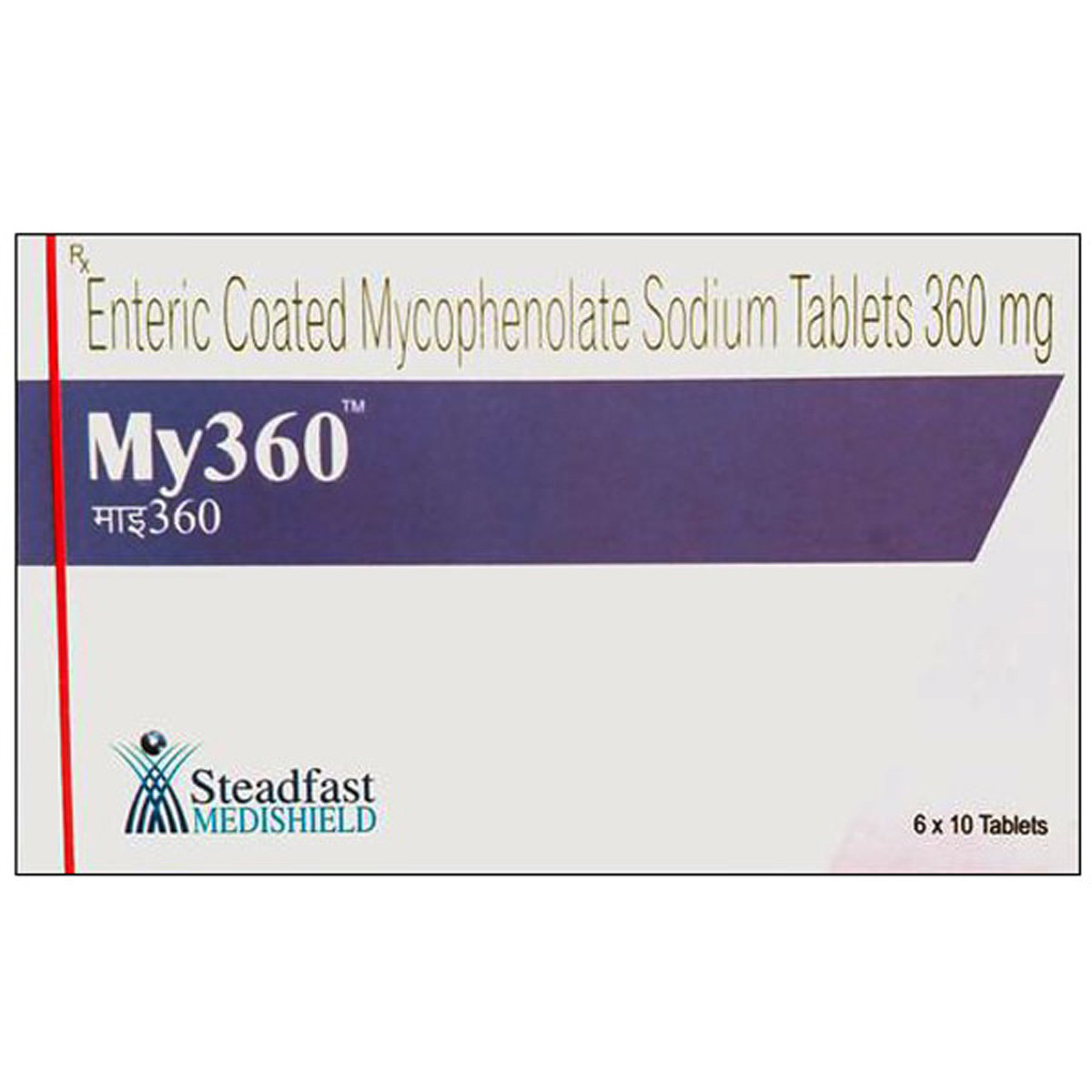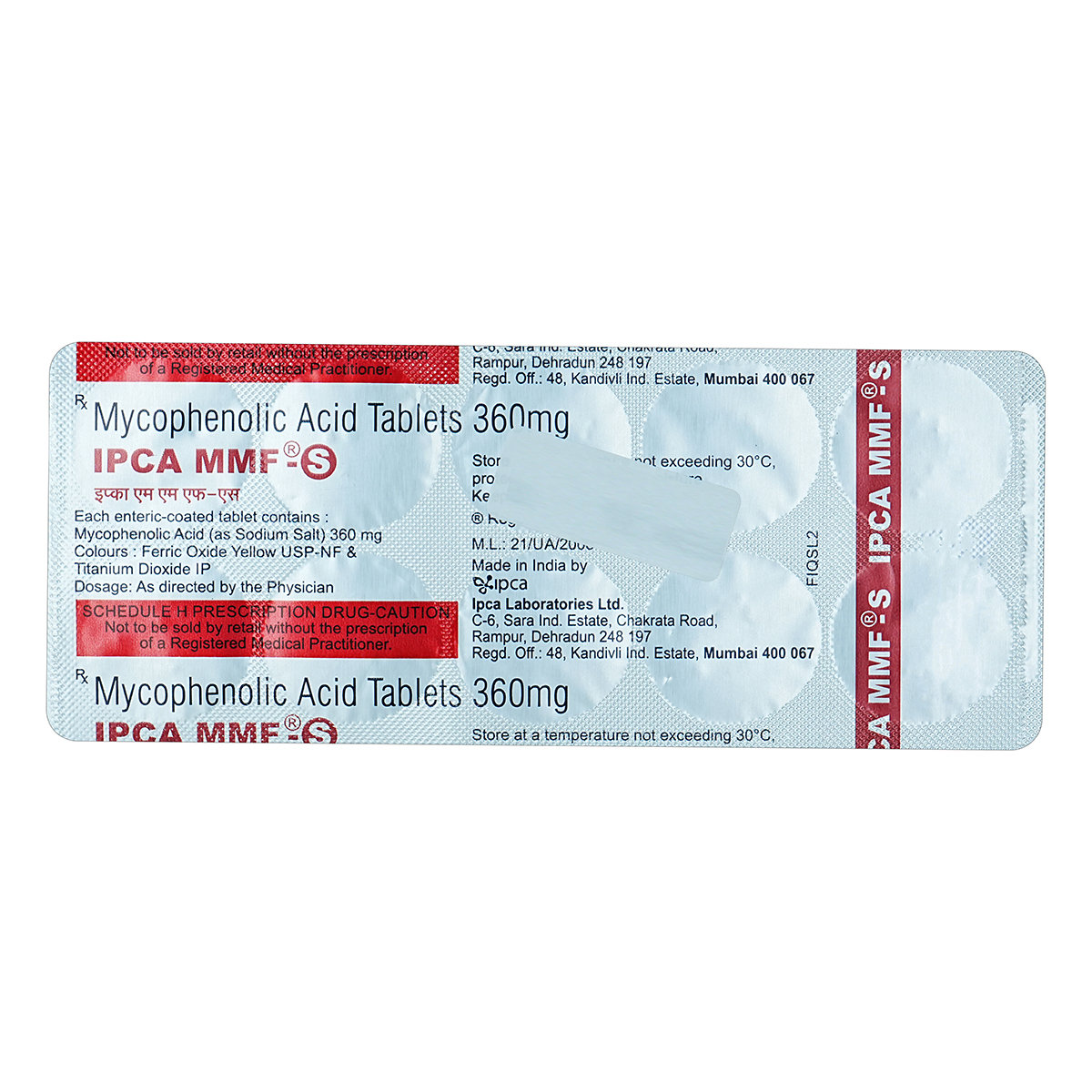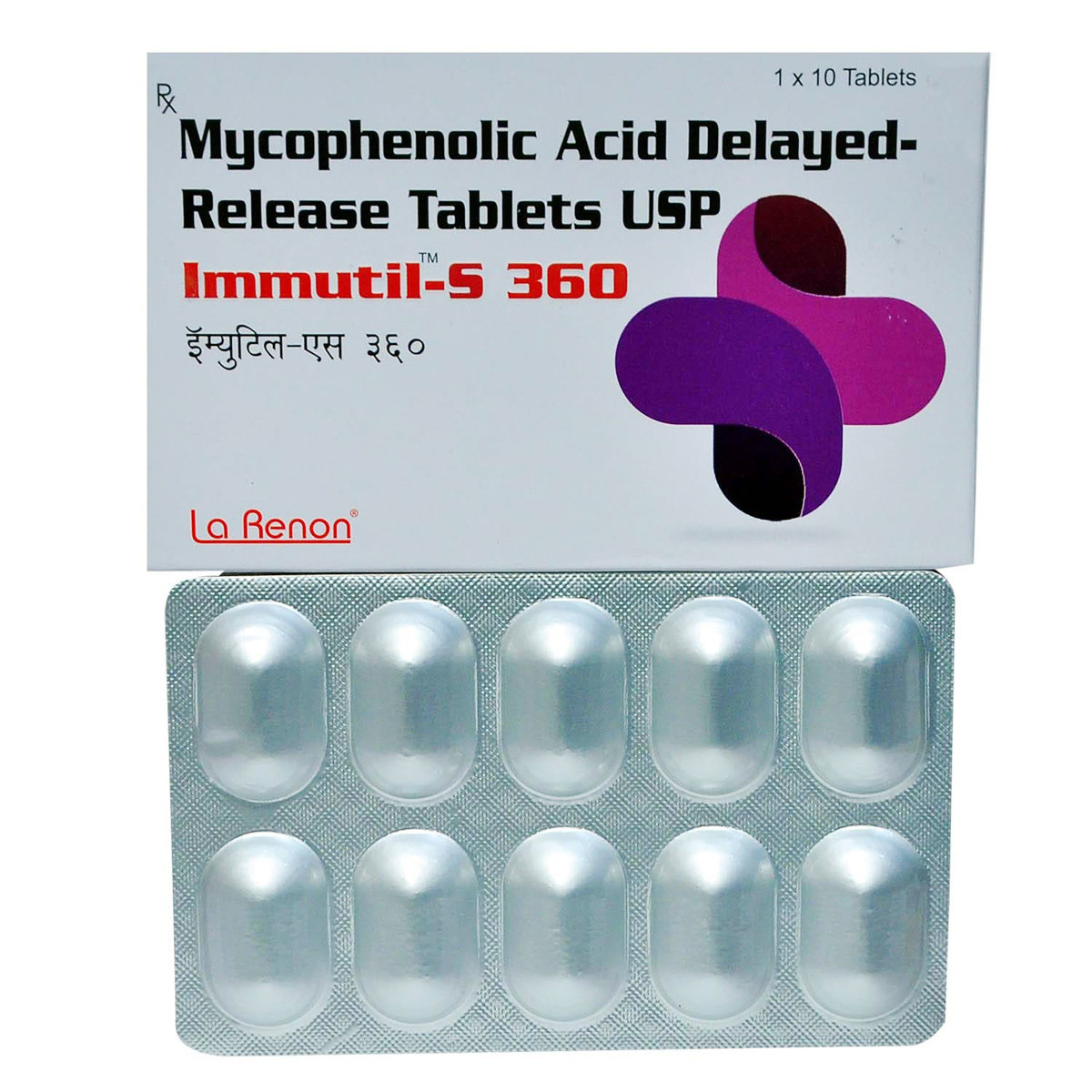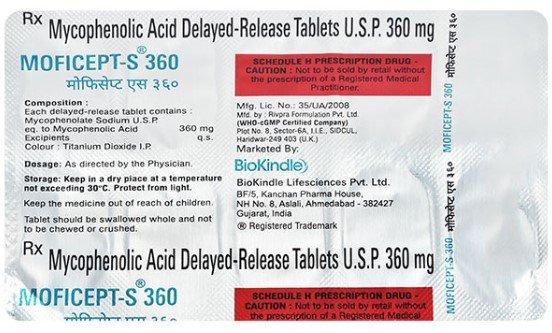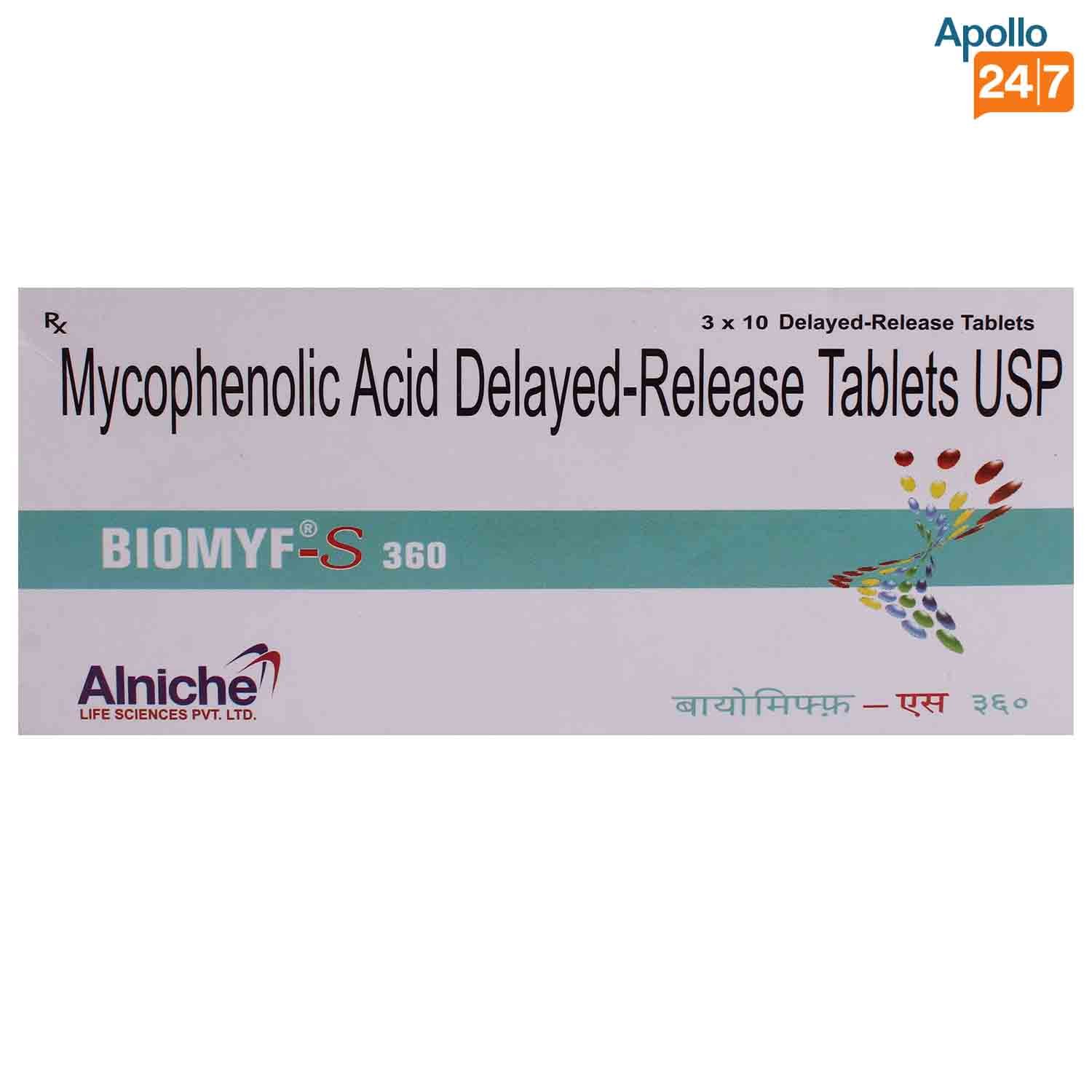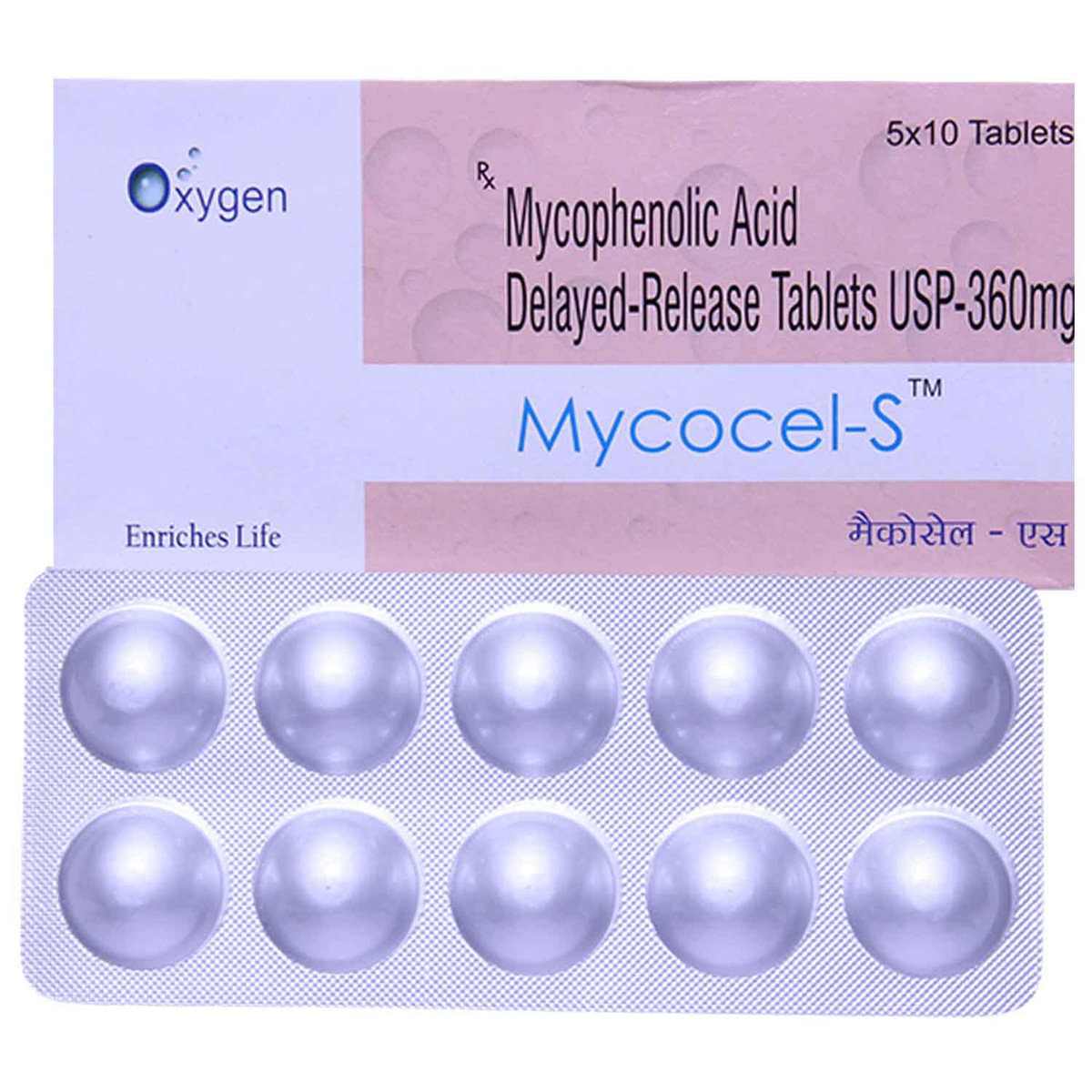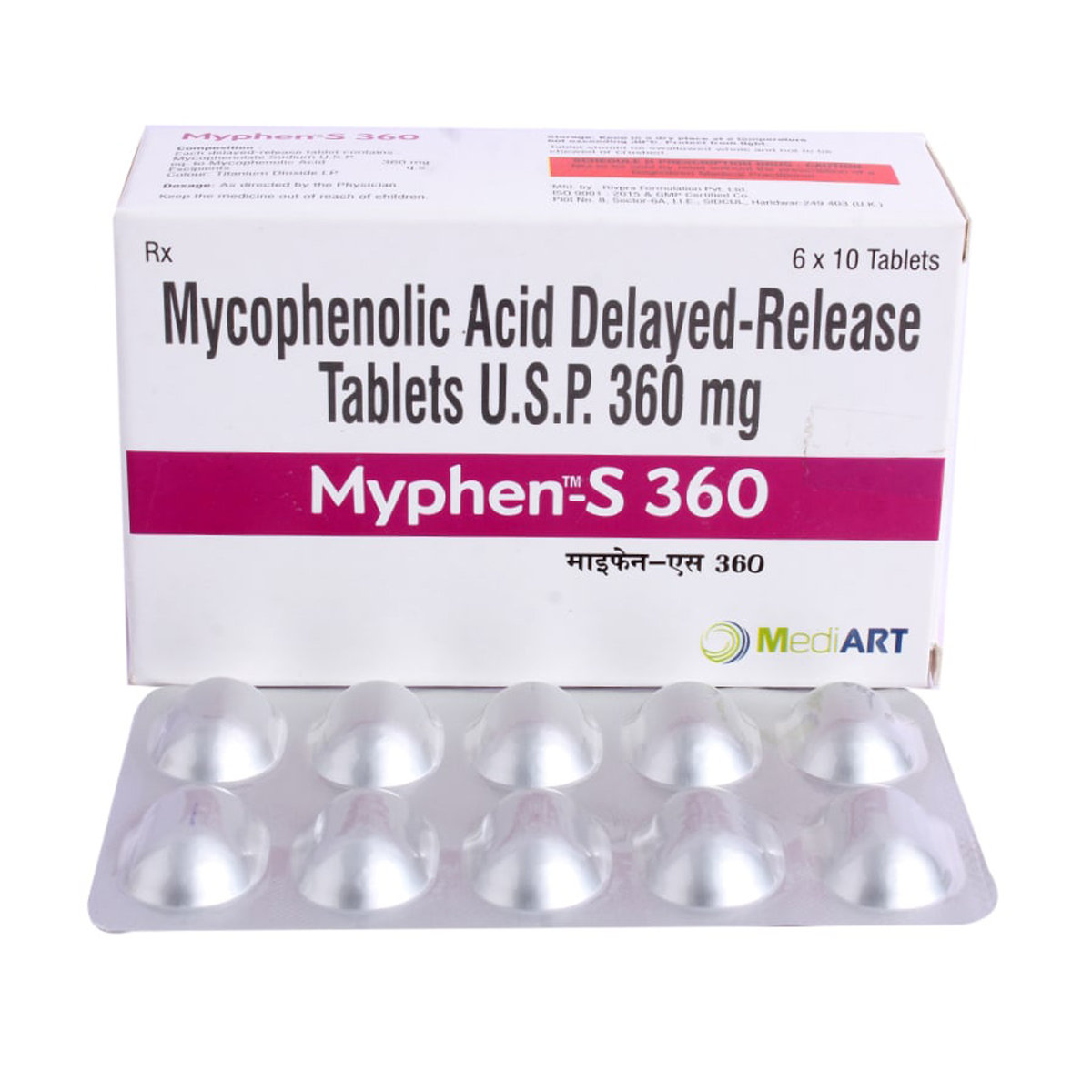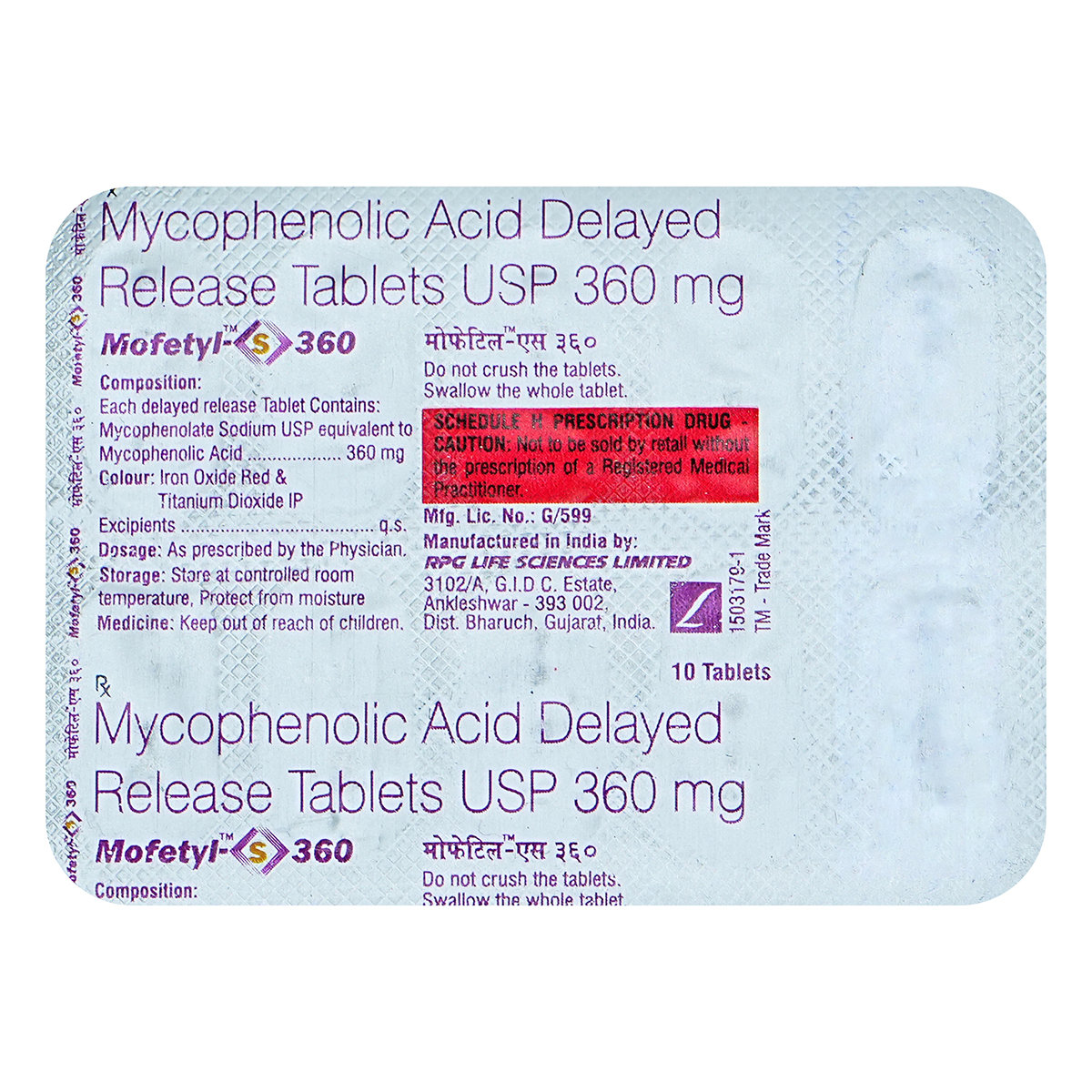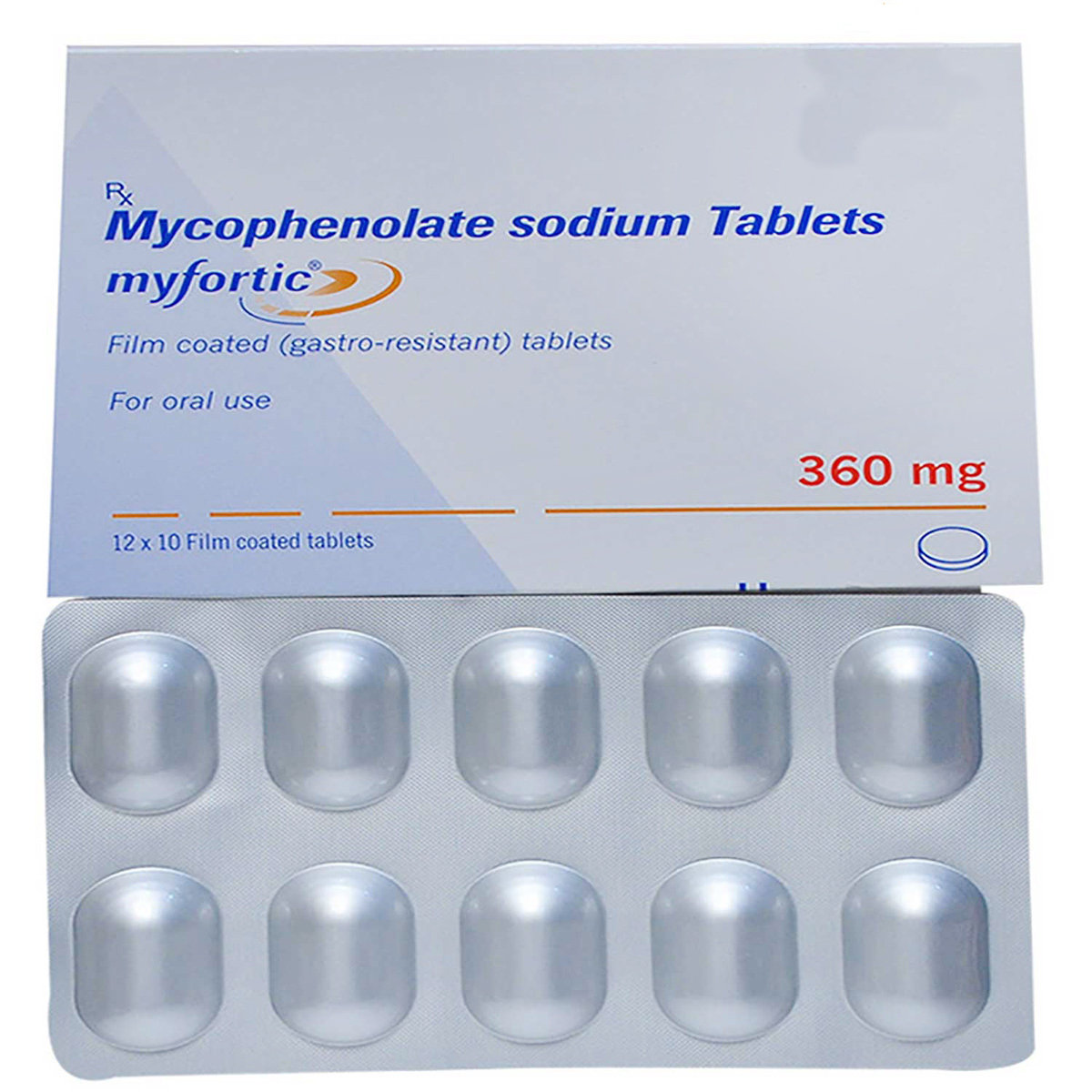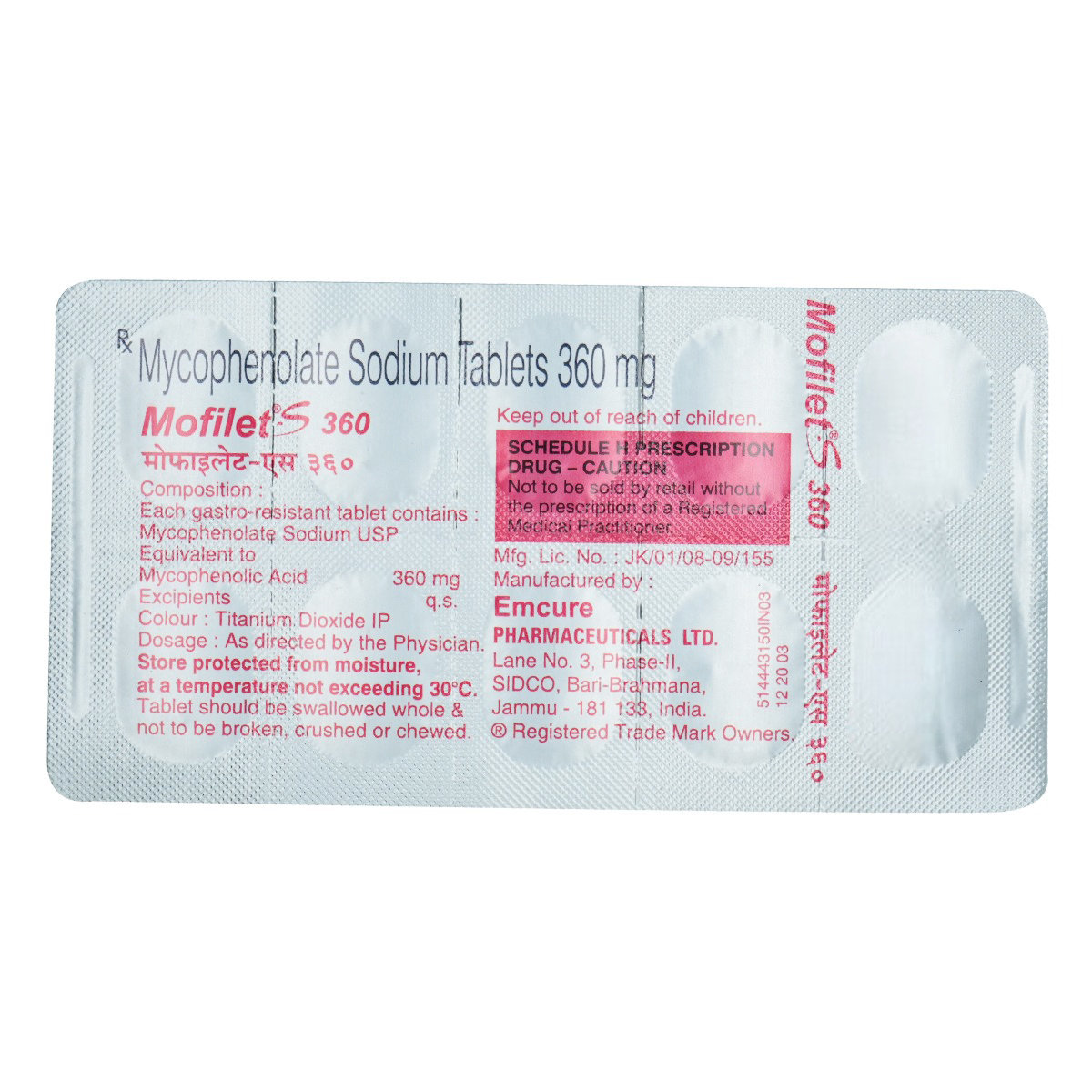MYCOPHEN S 360MG TABLET
MRP ₹836
(Inclusive of all Taxes)
₹125.4 Cashback (15%)
Provide Delivery Location
Online payment accepted
 Prescription drug
Prescription drugWhats That
Composition :
Manufacturer/Marketer :
Consume Type :
Expires on or after :
Return Policy :
About MYCOPHEN S 360MG TABLET
MYCOPHEN S 360MG TABLET belongs to a class of medications called ‘immunosuppressants’ used to prevent the body from rejecting a transplanted organ such as a kidney, heart or liver. Transplant rejection occurs when the recipient’s immune system identifies the transplanted organ as a ‘foreign object’ and attacks it. If it is not treated promptly, it may cause irreversible damage.
MYCOPHEN S 360MG TABLET contains ‘Mycophenolate sodium’ used in the treatment of organ transplant rejection along with another immunosuppressant and anti-inflammatory agent. It inhibits T and B lymphocytes (white blood cells that attack foreign cells) and suppresses antibodies' production (identify and kill foreign cells). These effects suppress the immune system so that the transplanted graft is not rejected.
You are advised to take MYCOPHEN S 360MG TABLET for as long as your doctor has prescribed it for you depending on your medical condition. In some cases, you may experience certain common side-effects, such as diarrhoea, cough, muscle pain, low blood pressure, fever and respiratory infections. Most of these side-effects do not require medical attention and will resolve gradually over time. However, you are advised to talk to your doctor if you experience these side-effects persistently.
To treat your condition effectually, continue taking MYCOPHEN S 360MG TABLET for as long as your doctor has prescribed. To avoid recurring symptoms, do not stop it midway. Do not take MYCOPHEN S 360MG TABLET if you are pregnant or planning for pregnancy. MYCOPHEN S 360MG TABLET should not be taken by breastfeeding mothers as it passes into breast milk. MYCOPHEN S 360MG TABLET should not be given to children as safety and efficacy have not been established. MYCOPHEN S 360MG TABLET may make you more susceptible to infections, consult your doctor if you develop fever, sore throat, breathlessness, jaundice, unexplained bleeding or bruising. Avoid excessive exposure to sunlight, wear protective clothing, and use protective sunscreen with a high protection factor while using MYCOPHEN S 360MG TABLET. Do not contact anyone who has shingles, chickenpox, or measles. Do not take MYCOPHEN S 360MG TABLET if you are not using effective contraception.
Uses of MYCOPHEN S 360MG TABLET
Directions for Use
Key Benefits
MYCOPHEN S 360MG TABLET contains ‘Mycophenolate sodium’ which belongs to the class of ‘immunosuppressants’. It is used to prevent organ transplant rejection. It reduces the activity of the immune system by inhibiting the action of white blood cells (responsible for immune reactions) in the body.
Storage
Drug Warnings
Do not take MYCOPHEN S 360MG TABLET if you are allergic to any immunosuppressant medicines or mycophenolate sodium. Let your doctor know before using MYCOPHEN S 360MG TABLET if you have liver or kidney problems, severe digestive issues, cancer, liver disease (such as hepatitis B, hepatitis C), current/past infections, rare genetic disorders (such as Lesch-Nyhan or Kelley-Seegmiller syndromes). Do not take MYCOPHEN S 360MG TABLET if you are pregnant or planning for pregnancy as MYCOPHEN S 360MG TABLET is a Pregnancy category risk D medicine which can cause serious congenital disabilities to the unborn baby. MYCOPHEN S 360MG TABLET should not be taken by breastfeeding mothers as it passes into breast milk. Pregnant women should use reliable forms of birth control while on treatment and for six weeks after stopping treatment with MYCOPHEN S 360MG TABLET. While taking MYCOPHEN S 360MG TABLET, do not contact anyone who has shingles, chickenpox, or measles. MYCOPHEN S 360MG TABLET causes dizziness and drowsiness, so drive with caution. MYCOPHEN S 360MG TABLET should not be given to children as safety and efficacy have not been established. Avoid consuming alcohol along with MYCOPHEN S 360MG TABLET as it could lead to increased dizziness. Your doctor may advise you to undergo regular blood tests, kidney and liver tests to monitor your condition. Avoid excessive exposure to sunlight, wear protective clothing, and use protective sunscreen with a high protection factor while using MYCOPHEN S 360MG TABLET.
Diet & Lifestyle Advise
- Physical activity helps in strengthening muscles and relieves joint stiffness. Gentle activities like 20-30minutes of walking or swimming would be helpful.
- Performing yoga may also help in improving joint flexibility and pain management.
- Maintain a healthy weight by performing regular low-strain exercises and eating healthy food.
- Get adequate sleep as resting the muscles can help in reducing inflammation and swelling.
- Follow heat or cold therapy, apply a cold or hot compress on the joints for 15-20minutes regularly.
- De-stress yourself by meditating, reading books, taking a warm bubble bath or listen to soothing music.
- Acupuncture, massage and physical therapy may also be helpful.
- Eat food rich in antioxidants such as berries, spinach, kidney beans, dark chocolate, etc.
- Foods containing flavonoids help in reducing inflammation. These include soy, berries, broccoli, grapes, and green tea.
Side Effects of MYCOPHEN S 360MG TABLET
- Dizziness
- Headache
- Cough
- Respiratory infections
- Weakness (asthenia)
- Muscle pain (myalgia)
- Shortness of breath (dyspnoea)
Habit Forming
Therapeutic Class
All Substitutes & Brand Comparisons
RX
Out of StockCellmune S 360 Tablet 10's
Cipla Ltd
₹560
(₹50.4 per unit)
33% CHEAPERRX
My 360 Tablet 10's
Steadfast MediShield Pvt Ltd
₹600
(₹54.0 per unit)
28% CHEAPERRX
MMF-S Tablet 10's
Ipca Laboratories Ltd
₹659.5
(₹59.36 per unit)
21% CHEAPER
FAQs
MYCOPHEN S 360MG TABLET belongs to the group of medications called ‘immunosuppressants’. It works by weakening the immune system by inhibiting the production of cells or antibodies that attack foreign cells. This effect helps in stopping the immune system from targeting and rejecting the transplanted organ.
MYCOPHEN S 360MG TABLET causes leukopenia (decreased number of white blood cells) and hence may make you more susceptible to infections. Consult your doctor if you develop any signs of infections such as fever, sore throat, breathlessness, jaundice, unexplained bleeding or bruising.
Diarrhoea might be a side-effect of MYCOPHEN S 360MG TABLET. Drink lots of fluids and eat food rich in fibre if you experience diarrhoea. If you find blood in stools (tarry stools) or if you experience prolonged diarrhoea consult your doctor. Do not take anti-diarrheal medicine on your own.
MYCOPHEN S 360MG TABLET can suppress the immune system and can increase the risk of skin cancer. So, it would be best if you avoid prolonged exposure to sunlight. Also, wear protective clothing covering your head, neck, arms and legs, and use a sunscreen lotion with a high SPF (sun protection factor).
MYCOPHEN S 360MG TABLET can suppress the immune system. You should not donate blood while using MYCOPHEN S 360MG TABLET and at least 60 days after stopping treatment as it makes you more prone to infections. Besides, men should not donate sperm while using MYCOPHEN S 360MG TABLET for at least 90 days after stopping the treatment.
Some medicines might absorb mycophenolate sodium delayed or absorbed fast if taken concomitantly such as antacids containing aluminium or magnesium, colestipol, cholestyramine or calcium-free phosphate binders. Before taking MYCOPHEN S 360MG TABLET, speak with your doctor about your ongoing medication list. Your doctor will decide whether they should be taken along with MYCOPHEN S 360MG TABLET or not.
The live vaccine may not work while on treatment with MYCOPHEN S 360MG TABLET. Do not have immunizations/vaccinations without talking to your doctor first. Also, avoid contact with people who recently had immunizations /vaccinations.
Drug-Drug Interactions Checker List
- TACROLIMUS
- CHOLESTYRAMINE
- ACTIVATED CHARCOAL
- ACICLOVIR
- GANCICLOVIR
Special Advise
- Use sunscreen while taking MYCOPHEN S 360MG TABLET, as it can make your skin more sensitive to sunlight and may cause skin cancer.
- Do not donate blood while using this medication and for 6 weeks after stopping it. Do not donate sperm while using this medication and for 90 days after stopping it.
Disease/Condition Glossary
Organ transplant rejection: When you get a new organ transplanted into your body, your body recognizes it as a foreign element and tries to attack and reject it because it is not originally part of your body. So, immunosuppressant drugs are given to such patients to suppress the immune system, stopping it from attacking the newly transplanted organs. Warnings signs of rejection are flu-like symptoms such as chills, headache, nausea, or vomiting, fever higher than 100o F, newly found pain at the region of the transplanted organ, weight gain and fatigue.

Have a query?
Alcohol
Safe if prescribed
You are recommended to avoid alcohol consumption while taking MYCOPHEN S 360MG TABLET. It could lead to increased dizziness and drowsiness.
Pregnancy
Consult your doctor
MYCOPHEN S 360MG TABLET may cause birth defects and miscarriage if taken during pregnancy. Follow contraception advice given by your doctor if you are a woman who could become pregnant. Also, undergo a pregnancy test before starting treatment with MYCOPHEN S 360MG TABLET.
Breast Feeding
Consult your doctor
It is not recommended to take MYCOPHEN S 360MG TABLET while you are breastfeeding. MYCOPHEN S 360MG TABLET passes into breast milk.
Driving
Safe if prescribed
MYCOPHEN S 360MG TABLET may cause dizziness, tiredness, do not drive or operate heavy machinery if you feel dizzy.
Liver
Consult your doctor
Take MYCOPHEN S 360MG TABLET only after the doctor's prescription, especially if you have liver diseases/conditions as your doctor may adjust the dose as required.
Kidney
Consult your doctor
Please consult your doctor if you have kidney impairment before taking MYCOPHEN S 360MG TABLET as your doctor may adjust the dose as required.
Children
Safe if prescribed
MYCOPHEN S 360MG TABLET should not be used by children below 18 years of age, as the efficacy and safety have not been established.





